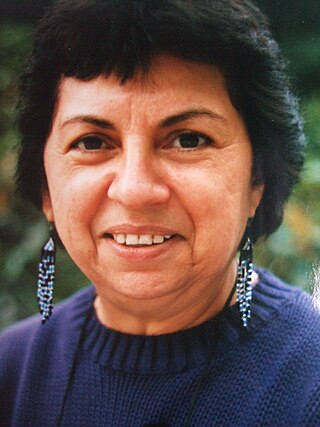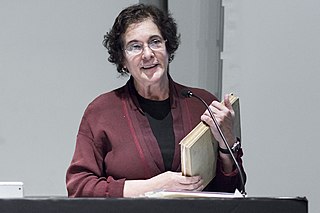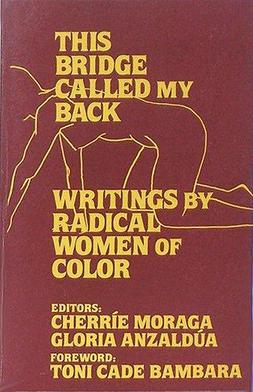
Mizrahi Jews, also known as Mizrahim (מִזְרָחִים) or Mizrachi (מִזְרָחִי) and alternatively referred to as Oriental Jews or Edot HaMizrach, are terms used in Israeli discourse to refer to a grouping of Jewish communities that lived in the Muslim world. Mizrahi is a political sociological term that was coined with the creation of the State of Israel. It translates as "Easterner" in Hebrew.

Cherríe Moraga is a Xicana feminist, writer, activist, poet, essayist, and playwright. She is part of the faculty at the University of California, Santa Barbara in the Department of English since 2017, and in 2022 became a distinguished professor. Moraga is also a founding member of the social justice activist group La Red Xicana Indígena, which is network fighting for education, culture rights, and Indigenous Rights. In 2017, she co-founded, with Celia Herrera Rodríguez, Las Maestras Center for Xicana Indigenous Thought, Art, and Social Practice, located on the campus of UC Santa Barbara.

Gloria Evangelina Anzaldúa was an American scholar of Chicana feminism, cultural theory, and queer theory. She loosely based her best-known book, Borderlands/La Frontera: The New Mestiza (1987), on her life growing up on the Mexico–Texas border and incorporated her lifelong experiences of social and cultural marginalization into her work. She also developed theories about the marginal, in-between, and mixed cultures that develop along borders, including on the concepts of Nepantla, Coyoxaulqui imperative, new tribalism, and spiritual activism. Her other notable publications include This Bridge Called My Back: Writings by Radical Women of Color (1981), co-edited with Cherríe Moraga.

Chicana feminism is a sociopolitical movement, theory, and praxis that scrutinizes the historical, cultural, spiritual, educational, and economic intersections impacting Chicanas and the Chicana/o community in the United States. Chicana feminism empowers women to challenge institutionalized social norms and regards anyone a feminist who fights for the end of women's oppression in the community.
Feminist anthropology is a four-field approach to anthropology that seeks to transform research findings, anthropological hiring practices, and the scholarly production of knowledge, using insights from feminist theory. Simultaneously, feminist anthropology challenges essentialist feminist theories developed in Europe and America. While feminists practiced cultural anthropology since its inception, it was not until the 1970s that feminist anthropology was formally recognized as a subdiscipline of anthropology. Since then, it has developed its own subsection of the American Anthropological Association – the Association for Feminist Anthropology – and its own publication, Feminist Anthropology. Their former journal Voices is now defunct.
Mzeina Bedouin are a Bedouin tribe in the southern Sinai Peninsula. It is the largest group of Bedouin people in Sinai.
Ella Habiba Shohat is an Iraqi-born Israeli-American professor of cultural studies at New York University, where she teaches in the departments of Art & Public Policy and Middle Eastern & Islamic Studies. She has written and lectured on the topics of Eurocentrism, orientalism, post-colonialism, trans-nationalism, diasporic cultures, and Iraqi-Jewish culture.

Lila Abu-Lughod is a Palestinian-American anthropologist. She is the Joseph L. Buttenweiser Professor of Social Science in the Department of Anthropology at Columbia University in New York City. She specializes in ethnographic research in the Arab world, and her seven books cover topics including sentiment and poetry, nationalism and media, gender politics and the politics of memory.

This Bridge Called My Back: Writings by Radical Women of Color is a feminist anthology edited by Cherríe Moraga and Gloria E. Anzaldúa, first published in 1981 by Persephone Press. The second edition was published in 1983 by Kitchen Table: Women of Color Press. The book's third edition was published by Third Woman Press until 2008, when it went out of print. In 2015, the fourth edition was published by State University of New York Press, Albany.
Renato Rosaldo is an American cultural anthropologist. He has done field research among the Ilongots of northern Luzon, Philippines, and he is the author of Ilongot Headhunting: 1883–1974: A Study in Society and History (1980) and Culture and Truth: The Remaking of Social Analysis (1989).
Norma Alarcón is a Chicana author and publisher in the United States. She is the founder of Third Woman Press and a major figure in Chicana feminism. She is Professor Emerita of Chicano/Latino Studies at the University of California, Berkeley.

Noura Saleh Erakat is a Palestinian-American activist, university professor, legal scholar, and human rights attorney. She is currently an associate professor at Rutgers University, specializing in international studies. Her primary focus being the Israeli–Palestinian conflict, she is a vocal critic of Israel.
Mizrahi Jews constitute one of the largest Jewish ethnic divisions among Israeli Jews. Mizrahi Jews are descended from Jews in the Middle East, North Africa and Central Asia and parts of the Caucasus, who had lived for many generations under Muslim rule during the Middle Ages. The vast majority of them left the Muslim-majority countries during the Arab–Israeli conflict, in what is known as the Jewish exodus from Arab and Muslim countries. A 2018 statistic found that 45% of Jewish Israelis identified as either Mizrahi or Sephardic.
Sexism in Israel manifests differently in different categories of Israeli population and culture.
The Feminist Studies Department at the University of California, Santa Cruz constitutes one of the oldest departments of gender and sexuality studies in the world. It was founded as a women's studies department in 1974. It is considered among the most influential departments in feminist studies, post-structuralism, and feminist political theory. In addition to its age and reputation, the department is significant for its numerous notable faculty, graduates, and students.

Emma Pérez is an American author and professor, known for her work in queer Chicana feminist studies.
Mizrahi feminism is a movement within Israeli feminism, which seeks to extricate Mizrahi women from the binary categories of Mizrahi-Ashkenazi and men-women. Mizrahi feminism is inspired by both Black feminism and Intersectional feminism, and seeks to bring about the liberation of women and social equality through recognition of the particular place Mizrahi women hold on the social map, and all the ways it affects Mizrahi women.

Ahoti – for Women in Israel is a feminist social movement, founded upon the principles of Mizrahi feminism. The movement works to promote issues of economic, social and cultural justice, and to empower and create solidarity among women of the lower socio-economic classes in Israel.

Bracha Serri was an Israeli poet, recipient of the Prime Minister's Literature Award for 1990.

The term Chicanafuturism was originated by scholar Catherine S. Ramírez which she introduced in Aztlán: A Journal of Chicano Studies in 2004. The term is a portmanteau of 'chicana' and 'futurism'. The word 'chicana' refers to a woman or girl of Mexican origin or descent. However, 'Chicana' itself serves as a chosen identity for many female Mexican Americans in the United States, to express self-determination and solidarity in a shared cultural, ethnic, and communal identity while openly rejecting assimilation. Ramírez created the concept of Chicanafuturism as a response to white androcentrism that she felt permeated science-fiction and American society. Chicanafuturism can be understood as part of a larger genre of Latino futurisms.










